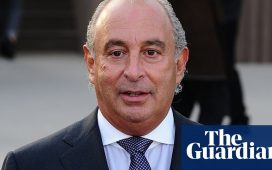Elon Musk, the billionaire owner of X, formerly known as Twitter, lacks understanding of European concerns over the hatred and division that can result from the spread of disinformation, a senior EU commissioner has said.
Speaking just days before the European parliamentary elections, in which disinformation, particularly Russian-backed propaganda, has been a key issue, Věra Jourová criticised what she said was a clear deterioration in content moderation on X since Musk bought the platform in 2022.
“Elon Musk, from the beginning of his endeavour with Twitter, I think he lacks some understanding of why we in the EU are so careful or cautious when we see the first seeds of something that might grow bigger, because of the history in the previous century where the first signs of antisemitism were not stopped,” she said.
“Because we have these bloody lessons from our history, we are more cautious, maybe, than the US.”
Jourová, as the European commission’s vice-president of values and transparency, deals with democracy, rule of law and disinformation in the 27-member bloc. She also stressed the need for Meta, the owner of Facebook and Instagram, to strengthen efforts to combat propaganda.
Ahead of the European elections, which run from Thursday until Sunday, Jourová said there had been waves of “attempts to influence the information space” and to polarise the public in countries such as Slovakia, where there was a recent attempted assassination of the prime minister, Robert Fico.
The commission was concerned about the “magnitude of disinformation” and the “magnitude of the reach” of platforms such as Facebook and X that reach billions worldwide, she added.
“Member states in the Baltics are worried in general about the big intensity of Russia propaganda reaching Russian-speaking citizens,” she said.
To fulfil their responsibility to remove illegal and foreign interference, big tech companies needed to employ people who knew what they were talking about, said Jourová, who had just returned from a visit to Silicon Valley.
She revealed that the commission was looking at whether it could bring the messaging app Telegram, popular in eastern European countries, into its regulatory orbit. With 41 million active users a month in the EU, it is below the 45 million-user threshold that would classified it under EU law as a “very large online platform”.
“We have to check [these numbers] because there are big complaints about Telegram, especially in the Baltic countries, and countries where there are a high number of Russian-speaking people,” said Jourová.
Sitting in her Brussels office beneath a large print of Václav Havel, the former Czech president, writer and cold-war dissident, and another of Anna Politkovskaya, the American-Russian journalist who was assassinated in Moscow in 2006, she spoke of how “damaged” society had become through efforts to undermine free and legal speech.
She said she had told X’s chief executive, Linda Yaccarino, that the “community notes” system the platform had introduced to improve its moderation was not the answer the EU was seeking.
Jourová said X argued that the notes, which allow users to challenge content, had a “self-purifying” effect.
“But my answer was: we would like to see factchecking done by the people who understand the subjects, who are not activists, who are not biased and who can recognise the difference between facts and opinions,” Jourová said.
after newsletter promotion
“You need people who understand the language, the history and the law of member states where key decisions of the supreme courts or constitutional courts have established what the limit of freedom of speech is. Words have meaning and that is why we would like them [X] to hire the professionals who can do this job,” she said.
She said she agreed with Musk that freedom of speech was a priority. But, she added, he needed to understand that in Europe, that freedom comes with a cluster of laws banning hate speech and incitement to violence. Big tech companies, she added, had to be alert to the creation of “waves of hate and racism” that could lead to a “chain of violence”.
Another matter of deep concern to the commissioner, who is not seeking to return to Brussels after her current mandate expires, is the impact of social media on children and young people.
There were “too many suicides, cases of bulimia, mentally ill young people, too much harassment, bullying”, she said, predicting that the mental health of children who have grown up on social media would be the “number-one topic in the next five years”.
Serious research was needed to gather data on the formative effect social media may have on young people’s values and their understanding of the principles of society and acceptable behaviour, Jourová said.
“This world has been broken, damaged somehow. My generation has spoiled a lot of things,” she said. “Our big hope is the younger generation, and suddenly I see that part of it is being entrapped by the system. It’s really scary. That’s why we need to discuss this at the highest possible level. There must be a discussion ongoing in the triangle of the worlds of politics, research and technologies.”
Telegram said it was abiding by EU sanctions on access to Russian outlets such as RT (formerly Russia Today) and Sputnik. It also said it was “not an effective platform for spreading disinformation” and “unlike other apps” it does not “use algorithms to promote sensational content”. It added it was giving access to uncensored news to users in Russia.
X and Meta have been approached for comment.










